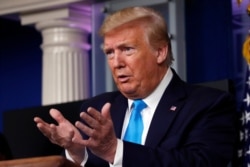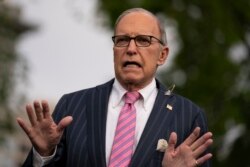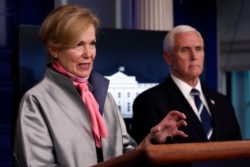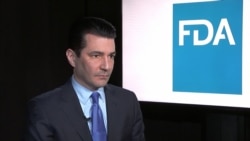President Donald Trump has repeatedly said that he wants to "reopen" the United States as soon as possible to reduce the economic damage caused by widespread social distancing rules implemented as a response to the novel coronavirus pandemic.
"Our country wasn't built to be shut down," Trump has said repeatedly. "This is not a country built for this."
As part of his push to see the country's economy begin the transition back to normal, the president is expected to announce the creation of a second coronavirus task force within the White House. According to the Washington Post, the new task force will be made up of administration officials including White House Chief of Staff Mark Meadows and Treasury Secretary Steven Mnuchin, as well as representatives of the private sector.
The aim of the task force will be to identify ways to bring as much of the economy as possible back on line beginning April 30, the day when the federal government's current social distancing guidance is supposed to expire. Among other things, the economic task force is expected to focus on identifying the kind of assistance businesses will need as they reopen.
However, public health experts caution that safely restarting the economy will be time-consuming, and evidence from China, where the virus appears to have lost steam, suggests that the process will not be as simple as flipping a switch.
Within the administration, there appears to be a growing realization that the U.S. economy may be idled for a considerable amount of time — far longer than the president has sometimes suggested.
His stated desire to see "packed churches" on Easter Sunday, April 12, is now generally regarded as wildly unrealistic. And calls to limit social distancing because of the economic harm it is causing — many echoed by the president in past weeks — have been mostly silenced.
On Tuesday, Trump's top economic adviser said public health experts will guide U.S. decisions about how and when to ease efforts to mitigate the spread of the novel coronavirus.
"It is the health people that are going to drive the medical decisions here, the medical-related decisions," White House economic adviser Larry Kudlow said in an interview with Politico.
Kudlow said he was being optimistic and hopes that "in the next four to eight weeks, we will be able to reopen the economy and that the power of the virus will be substantially reduced."
In an interview with Fox News, Kudlow said, "The president would like to reopen the economy as soon as he can, and we are planning internally," but he shared few details about the deliberations.
Asked about the plans to encourage businesses to reopen, Vice President Mike Pence said Tuesday that some of the "best minds" in the White House are working on such guidance. However, he did not offer a time frame and stressed that "the president's decision in that regard is going to be informed by what the data shows and about decisions about when we can responsibly reopen America and put America back to work."
Pence made the announcement flanked by two public health experts — Dr. Anthony Fauci, director of the National Institute of Allergy and Infectious Diseases, and Dr. Deborah Birx, coronavirus response coordinator for the White House Coronavirus Task Force.
Fauci and Birx have, at times, seemed to serve as a counterweight to the president's more unlikely statements and predictions, and their dedication to a data-driven approach to combating the virus now appears ascendant in the White House.
On Tuesday, Birx said that the information the task force is receiving is getting more thorough each day, and that "data analysis is allowing us to make very intelligent decisions about need, but also really understanding what's happening across the country."
If the administration really intends to be guided by public health experts, the guidelines for reopening the country could make even the outer limit of eight weeks suggested by Kudlow look overly optimistic.
Multi-phase proposal
Over the past week, the conservative American Enterprise Institute published a pair of reports authored by a group of public health experts, including Scott Gottlieb, who served as Trump's Food and Drug Administration commissioner from 2017 to 2019, offering a "road map" for reopening the country.
The study recommends a step-by-step approach in which the country would only slowly return to a semblance of normality as the capacity to test people for the virus and treat those who have it are improved. The authors propose a four-phase process to reopen the country and prepare it to deal with future pandemics.
According to their road map, the United States is only just beginning Phase 1, in which social distancing restrictions are used as an emergency measure to slow the spread of the virus at a time when testing is still not adequate, the real number of those infected remains unknown, and hospitals are either overwhelmed or at risk of being overwhelmed by the sick.
Phase 2 would allow for a gradual reopening of the economy on a regional basis, but the "triggers" identified for making the transition to Phase 2 are far from current reality.
According to the study, a state can safely proceed to Phase 2 when it meets four criteria: a sustained reduction in cases for at least 14 days; hospitals in the state are safely able to treat all patients; the state is able to test all people with COVID-19 symptoms; and the state is able to conduct active monitoring of confirmed cases and their contacts.
None of those criteria are currently met in the U.S. Even in areas where the number of new cases had begun to decline, testing is still not widespread, and the dramatic shortage of personal protective equipment and ventilators in hard-hit hospitals shows that the medical system is still under severe stress. Systems for active monitoring of confirmed cases and for tracing their contacts are still being developed.
The third phase of the process, in which all restrictions would be lifted, is further distant. According to the report, doing so would, at minimum, require the development of therapeutic techniques that reduce the lethality of the virus, or better, the approval of a vaccine to prevent it altogether.
In fact, according to Gottlieb, it would be unwise to expect a full economic recovery until a reliable vaccine can be developed that will give people peace of mind about returning to normalcy — and that is at least a year or more off.
"Absent that, this is going to be an 80% economy," Gottlieb said in an interview on CBS's "Face the Nation" over the weekend.
"There are things that are not coming back. People are not going to crowd into conferences. They're not going to crowd into arenas. The marginal customer is not going back to movie theaters and cruises and Disneyland. And we need to accept that. Now, what changes that equation is technology. But we need a deliberate approach to getting that technology quickly," Gottlieb said.
Watching China
Evidence from China suggests that Gottlieb is correct. The government has now lifted restrictions on the city of Wuhan, where the virus first emerged late last year. But despite triumphant statements by local officials that 97% of industrial businesses have reopened, media reports suggest that only about 60% of workers are showing up.
There is also the real possibility that in some areas, a resumption of something like normal activity could result in a resurgence of the virus. In late March, for example, Hong Kong's leaders believed that they had successfully avoided a serious outbreak of the virus. But after restrictions on travel were eased, the disease came roaring back, necessitating a further crackdown.
A study by researchers at Harvard's T.H. Chan School of Public Health suggests that the United States could be facing a period of up to two years in which social distancing restrictions must be applied intermittently, as localities face a periodic resurgence of infections.











